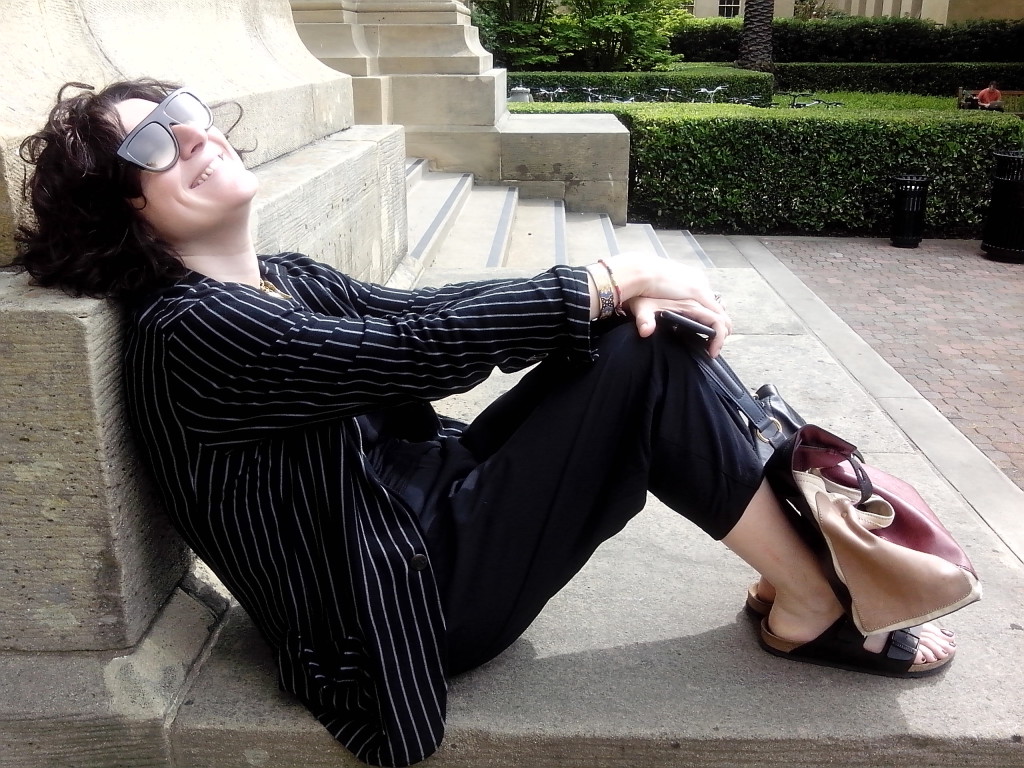Maria Stepanova: “Poetry is a powerful tool of inner resistance.”
Friday, June 16th, 2017
Taking in the California rays, on the steps of Stanford’s Green Library. (Photo: Cynthia Haven)
Maria Stepanova is a star at the Los Angeles Review of Books today. She’s already a supernova in her native land: the Muscovite is among the most visible figures in post-Soviet culture — not only as a major poet, but also as a journalist, a publisher, and a powerful voice for press freedom. She is the founder of Colta, the only independent crowd-funded source of information in Russia. The high-traffic online publication has been called a Russian Huffington Post in format and style, and has also been compared to The New York Review of Books for the scope and depth of its long essays. The Muscovite is the author of a dozen poetry collections and two volumes of essays, and is a recipient of several Russian and international literary awards.
My L.A.R.B. interview with her is here. A few excerpts below:

Photo: Sergey Melikhov
You know that all the cells of the human body are constantly replacing each other, and in seven years not a single cell of your old body is left. All that holds our personalities together is mere willpower — and our selves are as replaceable as brain cells. The human mind is a flowing thing, it is a process, and it happens somehow that the only solid and constant thing we can cling to is the inner zoo of the soul. I mean the persons and stories from the past that have no relationship to our own stories. Antigone or Plato or Brutus, invented or real, are actors in the theater of the mind. They do not change; they are strong enough for us to test them with our projections and interpretations. You could call the destructive element in yourself Medea or Clytemnestra — but it is you who is switching from one identity to another. In a mental theater, a single person plays all the parts.
And that’s how you see the poetic process?
I guess it is a fair description. A play is being performed, or maybe improvised, and there is an actor for every part, and a certain idiosyncratic language for each of them. But it is all centered on some very urgent question that is formulated from the outside, something you’ve been dealing with all your life: you’re born with this question and the need to answer it again and again. W. H. Auden spoke of neurosis as a life-shaping experience that is to be blessed — we’d never become what we are without it. I’m totally sure that certain patterns are shared, extrapolated to the scale of the whole society, so that everyone you know is shaped, at least partly, by the same problem. I guess this could describe what’s going on in a number of post-Soviet states; one can only wonder if a country can undergo some kind of therapy, if it can do collective work on collective trauma. Especially in times that are rather allergic to any collective project.
And this one:
Do you find that poetry, for you, is a space of freedom, even though it’s affected by your political predicament?
I feel that the poetry is a powerful tool of inner resistance, because what’s important, what really counts, is how much you let the outer forces deform you. Poetry keeps you in shape. More important than outward protests is inner freedom, the ability to stay yourself. That is usually the first thing you lose. You can imitate the motions and doings of free people but be utterly unfree inside. You become an expert in deforming your inner reality, to bring it into accord with what the state wants from you — and this could be done in a number of subtle, unnoticed ways. This kind of damage weighs on us the most.
The whole thing is worth a read here. She’s a fascinating and profound figure – and thoroughly unrepeatable, as great poets tend to be.


